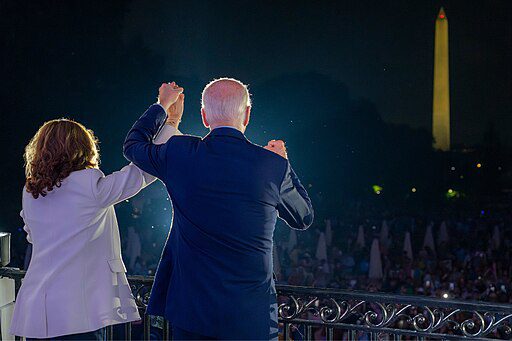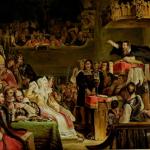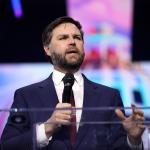
From an assassination attempt on a former president to the suspended campaign of a current president, Americans have faced a firehose of political news over the past few weeks. Many of knew that the 2024 election would be wild. But I personally didn’t imagine that it would be filled with so many plot twists that Aaron Sorkin himself would be writing about the connections between the political drama he scripted for The West Wing and the one we’re currently experiencing in real life.
The situation is overwhelming, even for me, a scholar and organizer whose chosen professional work is to read, write, teach, think, and talk about politics. I consider this labor to be important, and I consider it a blessing to do such meaningful work. And yet my daily practices have taken an unhealthy turn recently, with my consumption of political news becoming downright pathological. Early this month, I found myself reading updates about Biden’s campaign troubles while I was camping in the mossy mountains of Iceland and discussing the Republican National Convention while hiking in the northern Michigan woods. Rather than being fully present to appreciate the majesty of glacial waterfalls and the splendor of Midwestern wildflowers, I was unable to tear myself away from the world of American politics. Politics has affected more than my family time, my vacation travels, and my sleep hygiene. When I visited my family doctor for an annual check-up a couple weeks ago, we were both alarmed by my unusually high blood pressure. Her first piece of advice wasn’t to change my diet or exercise routine, but something completely different. “Sleep more,” she said, “and stop reading political news!”
It’s easier said than done, of course. The past month, especially the past ten days, has been filled with news that rightly leaves us uncertain and unsettled. An attempted assassination and a late change in presidential candidates are significant events that people with a sincere commitment to a flourishing democracy should absolutely read, think, and talk about.
What concerns me, though, is that our news consumption and conversation habits often don’t reflect and promote serious, meaningful, and healthy civic engagement. Instead, I observe people treating the election like the ultimate sports matchup, with online discussion focused on poll analysis and presidential ticket dream teams, all to score a big political win. We’re turning the most sacred responsibilities of our democracy—voting and engaging in political discourse with our fellow citizens—into another form of crass entertainment, and we’re practicing what the political scientist Eitan Hersh calls “political hobbyism.”
The day after what’s arguably the most surprising political event (yet) of the 2024 election, I imagine that many people, myself included, are tempted to spend time refreshing news websites, reading more political commentary on X, and debating who Kamala Harris will pick as her running mate. But I’m here to make a plea: don’t do this. We can’t afford to spend our days doomscrolling, idly chattering about political news, and treating politics as yet another spectacle meant to entertain us. Doing so is unproductive and hardly conducive to the wellbeing of our communities, our country, and our very bodies. Instead, we need to roll up our sleeves and get serious about doing more of the real, substantive work that is the bedrock of a healthy political life: nurturing relationships, caring for our neighbors, and building power to create communities where we can thrive.
The perils of “political hobbyism”
In his 2020 book Politics is for Power, Hersh describes “political hobbyism” as “consuming and participating in politics by obsessive news-following and online ‘slacktivism,’ by feeling the need to offer a hot take for each daily political flare-up, by emoting and arguing and debating, almost all of this from behind screens or with earphones on.” He notes that the people who practice political hobbyism are not “seeking to influence our communities or country” but “are engaging to satisfy our own emotional needs and intellectual curiosities.” Political hobbyists, he says, tend to be well-educated, white, and male, but what defines them is less about who they are and more about what they do and fail to do. As he explains, people who treat politics as a hobby “will follow the news, join an email list, make an occasional financial contribution, or attend a one-off rally, but they will shy away from deeper organizational engagement” and ultimately “tend to treat politics as if it were a game.” They are “motivated by their emotional needs and a pursuit of personal gratification rather than a deeper commitment to the common good.”
In Hersh’s view, political hobbyism is “a serious threat to democracy” for several reasons:
First, we are making politics worse. Our collective treatment of politics as if it were a sport affects how politicians behave. They increasingly believe they benefit from feeding the red meat of outrage to their respective bases, constantly grandstanding for the chance that a video of themselves will go viral. In treating politics like a hobby, we have demanded they act that way. Second, hobbyism takes us away from spending time working with others to acquire power. While we sit at home, people who seek political control are out winning over voters.
To illustrate this point, he points to the Ku Klux Klan in North Carolina, where KKK members were assisting community members suffering opioid addiction and presenting their help as a demonstration of how the KKK will save them. “This image haunts me not just because in it I see an organization I fear that is serious about power, that recognizes how service to one person at a time aggregates into power,” says Hersh. “The image haunts me juxtaposed to how most of the rest of us are doing politics.”
Doing politics differently
Hersh points to a different approach to politics, one that focuses less on debating national political drama and more on building local organizations and leaders, cultivating caring relationships with our community, and attending to the immediate needs of our neighbors. “If you feel unfulfilled, melancholy, paralyzed by the sadness of the news and depth of our political problems,” he writes, “I hope I can show you the redemption of politics as a service to others, a form of politics where participants get power to improve their communities, present and future.”
I read Politics is for Power in the winter of 2020, around the time when the United States held its first primaries for that year’s presidential election. After I read the book, I began to look at the political discourse around me in a completely new way. As the presidential race developed throughout that winter, I saw intense Facebook discussions about the reliability of polls, the electability of candidates, and the demise of our democracy undertaken by people who never once volunteered to support voter education or mobilization efforts. In the spring, after the murder of George Floyd sparked global protests against racial inequity and police violence, I witnessed Twitter debates about the Black Lives Matter protests undertaken by people who did little to support racial justice work in their churches, schools, and neighborhoods. Most significantly, I began to turn a critical eye to my own political behavior, and I started to pay attention to how my own political hobbyism not only made little impact, but also made me feel worse. I realized that spending an evening registering voters and helping my neighbors submit their absentee ballots was far more satisfying than arguing on Facebook about how to interpret the latest public opinion polls.
In the years since 2020, I changed course entirely. I began to focus on the happenings in my own city, reading the Indianapolis Star instead of the New York Times, and paying closer attention to local elections, local issues, and local community organizations. I joined an array of grassroots groups focused on specific issues that were of immediate concern to my neighbors—an interfaith group interested in addressing gun violence, for example, and an Asian American women’s group committed to racial equity and voter protection, education, and mobilization. I eventually launched my own non-profit organization that aims to build Asian American civic engagement in Indiana.
More than anything, I shifted my attention away from talking about politics on social media (although I am still guilty of doing that) and doing politics in a way that is centered on a basic principle: caring for my neighbors. In the process, I found my politics beginning to bear a bit in common with what Nancy Ammerman describes as “Golden Rule Christianity.” While this “Golden Rule Christianity” might have been more pervasive in the late 1990s, when Ammerman coined that term, it feels almost countercultural now, in an age of aggressive Trumpian Christian nationalism. It also feels surprisingly good—a welcome antidote to the helplessness Americans often feel in response to the intractable problems and the political polarization that plague us. In doing politics in this way, I actually feel a degree of moral integrity and political efficacy, and that in itself is precious.
When the news broke yesterday afternoon that Biden was suspending his campaign, I was the last one in my family to know, despite the fact that I’m the one most obsessed with politics. At the time, I happened to be away from my computer with my phone on “Do not disturb” mode because I was with the leaders of my non-profit, hosting a community conversation in Indianapolis and learning about what Asian American Hoosiers experience, value, and need. Rather than idly following political news, I was trying to do what Hersh recommended people do: leaning into the work of caring for and cultivating relationships with my neighbors.
I learned about Biden’s decision only through a family text exchange that I read later in the day.
“Melissa’s BP will be better and stay at normal range,” texted my mom after she shared the news.
“Or she will be endlessly stressed about what is next,” my husband responded. “I will need to confiscate her phone.”
We enjoyed a good chuckle about the idea that my blood pressure levels might directly correlate to developments in the presidential race, but the fact is that my mom and my husband are pretty wise, being medical professionals who know me well, and there’s truth to what they said. Stepping back from the nonstop consumption of news and the bad habits of political hobbyism will probably improve my blood pressure and enable a healthier me. More importantly, by choosing to do politics a different way, I’m hopeful that it’ll also enable a healthier democracy.













